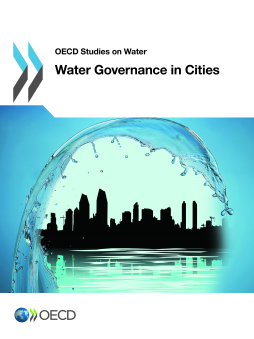
BOOK
Water Governance in Cities
(2016)
Additional Information
Book Details
Abstract
Urban, demographic and climate trends are increasingly exposing cities to risks of having too little, too much and too polluted water. Facing these challenges requires robust public policies and sound governance frameworks to co-ordinate across multiple scales, authorities, and policy domains. Building on a survey of 48 cities in OECD countries and emerging economies, the report analyses key factors affecting urban water governance, discusses trends in allocating roles and responsibilities across levels of government, and assesses multi-level governance gaps in urban water management. It provides a framework for mitigating territorial and institutional fragmentation and raising the profile of water in the broader sustainable development agenda, focusing in particular on the contribution of metropolitan governance, rural-urban partnerships and stakeholder engagement.
Table of Contents
| Section Title | Page | Action | Price |
|---|---|---|---|
| Cover | Cover | ||
| Table of contents | 5 | ||
| Acronyms and abbreviations | 9 | ||
| Executive summary | 11 | ||
| Key messages | 12 | ||
| Chapter 1. Urban water governance today – Setting the scene | 15 | ||
| Key messages | 16 | ||
| Why urban water governance matters | 16 | ||
| Methodology | 18 | ||
| Analytical framework | 20 | ||
| Characteristics of cities affecting urban water governance | 22 | ||
| Cities by size | 23 | ||
| Spatial organisation | 24 | ||
| Demographic dynamics | 25 | ||
| Cities by metropolitan governance arrangements | 26 | ||
| Notes | 30 | ||
| Bibliography | 31 | ||
| Chapter 2. Factors shaping urban water governance | 33 | ||
| Key messages | 34 | ||
| Water infrastructure challenges in cities | 34 | ||
| The risks of too much, too little, too polluted water | 41 | ||
| Institutional factors | 42 | ||
| Environmental and socio-economic factors | 44 | ||
| Summary of factors that affect different types of surveyed cities | 48 | ||
| Notes | 50 | ||
| Bibliography | 50 | ||
| Chapter 3. Mapping who does what in urban water governance | 55 | ||
| Key messages | 56 | ||
| Central governments | 56 | ||
| Sub-national governments | 59 | ||
| Other actors at the sub-national level | 63 | ||
| Service providers | 65 | ||
| Conclusion | 70 | ||
| Notes | 71 | ||
| Bibliography | 71 | ||
| Chapter 4. Multi-level governance gaps in urban water management | 75 | ||
| Key messages | 76 | ||
| OECD’s multi-level governance framework | 76 | ||
| Scale | 77 | ||
| Fragmentation and policy silos | 79 | ||
| Diverging objectives compromising long-term management | 80 | ||
| Financing | 81 | ||
| Capacity and information | 86 | ||
| Accountability | 89 | ||
| A summary of multi-level governance gaps by types of surveyed cities | 92 | ||
| Notes | 95 | ||
| Bibliography | 96 | ||
| Chapter 5. Governance instruments for urban water management | 97 | ||
| Key messages | 98 | ||
| The 3Ps co-ordination framework | 98 | ||
| Policy | 99 | ||
| Vertical and horizontal co-ordination mechanisms | 99 | ||
| Policy complementarities | 101 | ||
| Places | 105 | ||
| Metropolitan governance | 105 | ||
| Rural-urban partnerships | 111 | ||
| People | 116 | ||
| Stakeholder engagement | 116 | ||
| Mechanisms to engage with stakeholders | 121 | ||
| Forward-looking strategies for urban water governance | 126 | ||
| Ways forward for stronger local-national frameworks for managing water in cities | 129 | ||
| A prominent role for cities | 130 | ||
| A shared responsibility between cities and their hinterland | 130 | ||
| A need for joint undertaking between cities and upper levels of government | 131 | ||
| Notes | 133 | ||
| Bibliography | 134 | ||
| Annex A. Respondents to the OECD Survey on Water Governance for Future Cities | 137 |
